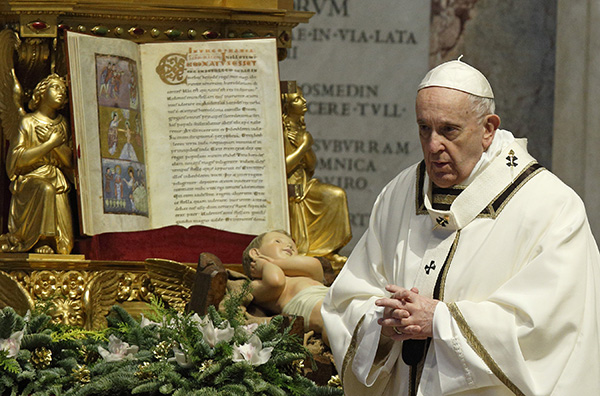
By Elise Ann Allen
ROME (Crux) – Pope Francis during a Mass for the feast of the Epiphany advocated what he called an attitude of “theological realism,” which, he said, fosters trust in God and looks for deeper meaning rather than getting caught up in one’s own problems.
Speaking during a Jan. 6 livestreamed Mass in St. Peter’s Basilica, the pope said that to worship God, “We need to ‘see’ beyond the veil of things visible, which often prove deceptive.”
Pointing to the biblical figure of King Herod, who sought to kill Jesus, seeing the infant as a threat to his rule, Pope Francis said Herod and the leading citizens of Jerusalem “represent a worldliness enslaved to appearances and immediate attractions. A worldliness that values only the sensational, the things that capture the attention of the masses.”
“In the Magi, however, we see a very different approach, one we can define as theological realism: a way of perceiving the objective reality of things and leads to the realization that God shuns all ostentation.”
This attitude, he said, is a way of viewing reality “that transcends the visible and makes it possible for us to worship the Lord who is often hidden in everyday situations, in the poor and those on the fringes.”
It is a way of seeing things, he said, “that is not impressed by sound and fury, but seeks in every situation the things that truly matter.”
Pope Francis spoke during his Mass for the Jan. 6 feast of the Epiphany, which celebrates the arrival of the three Magi, also called the three Wise Men or the three Kings, to the stable in Bethlehem where Jesus was born after following a star that led the way.
Due to ongoing restrictions of public gatherings related to the coronavirus pandemic, the pontiff’s Mass was private, with a limited number of faithful present, who sat distant from one another and wore medical facial masks.
This marked the first holiday Mass Pope Francis celebrated since he skipped his New Year’s Eve vespers liturgy and his New Year’s Day Mass for the feast of Mary, Mother of God, due to what the Vatican called a “painful sciatica.”
During Wednesday’s liturgy, Pope Francis was standing for a large portion of the event and appeared to limp slightly but otherwise seemed free of pain.
In his homily, the Holy Father said that worship of God is especially important in modern times, insisting that “if we do not worship God, we will worship idols; instead of becoming believers, we will become idolaters.”
“There is no middle ground; either God or idols,” he said, adding, “whoever doesn’t adore God, adores the devil … We need to learn ever better how to contemplate the Lord,” he said, pointing to the Magi as an example.
Focusing on three phrases from the day’s scripture readings, he stressed the need to “lift up our eyes” in order to take the focus off of oneself.
In the passage from which the phrase is taken, the prophet Isaiah urges the people in Jerusalem stop complaining and “to escape the bottleneck of a narrow way of seeing things, to cast off the dictatorship of the self, the constant temptation to withdraw into ourselves and our own concerns, not to let ourselves be imprisoned by those imaginary specters that stifle hope, not to make our problems and difficulties the center of our lives,” he said.
This does not mean “denying reality” deluding oneself into thinking that everything is fine, he said, but is rather “a matter of viewing problems and anxieties in a new way, knowing that the Lord is aware of our troubles, attentive to our prayers and not indifferent to the tears we shed.”
This attitude leads to a sense of gratitude, he said, insisting that by focusing only on one’s problems without looking to God, “fear and confusion creep into our hearts, giving rise to anger, bewilderment, anxiety and depression.”
“Then it becomes difficult to worship the Lord,” he said, adding, “Once this happens, we need to find the courage to break out of the circle of our foregone conclusions and to recognize that reality is much greater than we imagine.”
Pope Francis then said there is a need “to set out on a journey,” noting that the Magi found the infant Jesus only after undertaking a lengthy journey themselves. A journey, he said, “always involves a transformation, a change. After a journey, we are no longer the same.”
Insisting that worship is a gradual process, Pope Francis noted that this worship looks different at age 30 than it does at 50.
“Those who let themselves be shaped by grace usually improve with time: on the outside, we grow older – so Saint Paul tells us – while our inner nature is being renewed each day, as we grow in our understanding of how best to worship the Lord,” he said.
From this perspective, failures, crises, and mistakes “can become learning experiences,” Pope Francis said, noting that these experiences can often “help us to be more aware that the Lord alone is worthy of our worship, for only he can satisfy our innermost desire for life and eternity.”
“With the passage of time, life’s trials and difficulties – experienced in faith – help to purify our hearts, making them humbler and thus more and more open to God,” he said, adding, “We cannot let our weariness, our falls and our failings discourage us.”
“Instead, by humbly acknowledging them, we should make them opportunities to progress towards the Lord Jesus,” he said, stressing the need to see beyond the things that are visible, which “often prove deceptive,” and focus on something deeper, like the Magi did.
Pope Francis closed his homily praying that God would “make us true worshipers, capable of showing by our lives his loving plan for all humanity.”

Humility is the beginning of wisdom. The three wise men from the East were humble in their search.